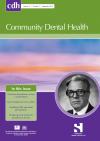Community Dental Health

- Cover Date:
- September 2015
- Print ISSN:
- 0265 539X
- Vol:
- 32
- Issue:
- 3
Effect of family caregiver oral care training on stroke survivor oral and respiratory health in Taiwan: a randomised controlled trial
Community Dental Health (2015) 32, 137–142 Received 19 December 2014; Accepted 4 February 2015
doi:10.1922/CDH_3572Kuo06
Effect of family caregiver oral care training on stroke survivor oral and respiratory health in Taiwan: a randomised controlled trial
Y-W. Kuo, M. Yen, S. Fetzer, J-D. Lee and L-C. Chiang
Objective: To evaluate the effectiveness of home-based oral care training programs on tongue coating (TC), dental plaque (DP), and symptoms of respiratory infection (SRI) in stroke survivors. Methods: A single-blind, randomised, controlled trial conducted in a home-based setting over 2 months. Stroke survivors (n=48, experimental group) and their family caregivers received home-based oral care training programme while a control group of 46 stroke survivors and family caregivers received routine oral care education with swabs. TC, DP, and SRI were assessed at baseline and after one and two months, with results analysed using Mixed Model ANOVA. Results: Poor oral hygiene and overall neglect of home oral care practices were observed at baseline. TC and DP scores were significantly reduced in the experimental group receiving the home-base oral care training program compared to the control group, who received only routine oral care education (P<0.001). The group×time interaction was significant, with decreased TC and DP scores for both groups at one month and at two months of additional care (when compared to baseline). The SRI scores were not significantly different between groups (P>0.05). The group×time interaction did not correlate with SRI for either group when compared to the baseline and to one month and two months of additional care. No adverse events were encountered and there was no external funding. Conclusions: Home-based oral care training programme had a beneficial effect on oral health as measured by TC and DP scores. The effect on SRI requires further longitudinal study.
Key words: oral care, stroke survivors, tongue coating, dental plague, symptom of respiratory infection
- Article Price
- £15.00
- Institution Article Price
- £
- Page Start
- 137
- Page End
- 142
- Authors
- Y-W. Kuo, M. Yen, S. Fetzer, J-D. Lee, L-C. Chiang
Articles from this issue
- Title
- Pg. Start
- Pg. End
- Relationship between family characteristics and children’s regular toothbrushing with fluoride toothpaste
- 132
- 136
- Effect of family caregiver oral care training on stroke survivor oral and respiratory health in Taiwan: a randomised controlled trial
- 137
- 142
- Association of oral health literacy with oral health behaviour and oral health status in Belarus
- 148
- 152
- Comparing UK, USA and Australian values for EQ-5D as a health utility measure of oral health
- 180
- 184
